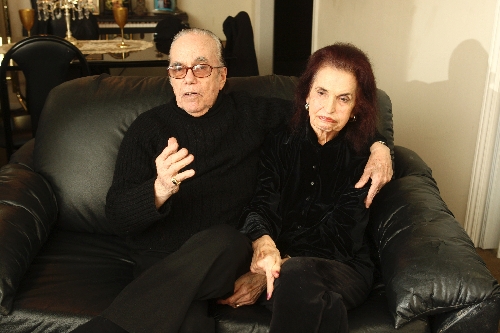‘System is really a sham’
Ely Borax, 82, a retired actor, dancer and Army drill sergeant, listened attentively as his son Michael argued a foreclosure mediation case before Clark County District Court Judge Donald Mosley on Tuesday.
Ely Borax wanted Mosley to order OneWest Bank to resume mediation over a pending foreclosure against his home in the Las Vegas Country Club.
The family argued that OneWest Bank, which took over the operations of failed IndyMac Federal Bank of Pasadena, Calif., had not participated in the mediation in good faith.
A mediator who didn't attend Mosley's hearing, however, didn't check the box that would have signaled that OneWest failed to comply with mediation requirements. Had the mediator refused to certify the mediation, foreclosure would have been halted pending new mediation.
Mosley told Ely, his wife, Barbara, and their son that it was "heartbreaking" to hear foreclosure mediation cases, because people have strong personal attachments to their homes.
The judge, however, said he had to rely on the document from the mediator.
"I can't go behind the motivation of both parties," Mosley said. "The law is what the law is, and it does not require that there is any agreement (to modify the mortgage)."
Outside in the hall, Ely Borax was bitter.
"This mediation system is really a sham," he said.
Professionals involved in foreclosure, however, say that the state's foreclosure mediation program has helped some homeowners.
William Gang, public information officer for the Nevada Supreme Court, which administers the program, said mediation has enabled some people to keep their homes. He is waiting for a study that will provide a better answer about how well the program has worked.
"There is no silver bullet," real estate attorney Tisha Black-Chernine said.
Through mediation, she has persuaded lenders to reduce interest rates or to allow clients to skip payments for a few months. Other times banks agreed to waive their right to sue for a deficiency if the home is sold in a "short sale" for less than the amount owed, she said.
Lenders and mortgage loan servicers aren't willing to reduce the principal amount owed as Ely Borax requested, Black-Chernine said.
"For whatever reason, they are not going to do that," she said.
Ian Hirsch, owner of Fortress Credit Services, said lenders have reduced the principal owed for some clients, although that is uncommon. The monthly payments have been cut by 25 percent to 50 percent and interest rates have been trimmed to 2 percent.
"It's a positive step that the state is taking, making the banks actually listen," he said. "Today, it is just a forum for discussion, but the mediator can't make the bank change the terms of the loan."
Bill Uffelman, chief executive officer of the Nevada Bankers Association, said the program is working. He pointed to Nevada Supreme Court numbers showing that more than 10 percent of borrowers have signed up for mediation and one-quarter of those seeking mediation have completed the process.
The state's high court counts 50,559 notices of default for all types of real estate issued between July 1 and the end of February. During that period, 5,814 homeowners signed up for mediation. So far, 1,440 cases have been mediated.
Uffelman said that borrowers didn't need a mandatory mediation program to reach their lender. He also pointed out that unemployed workers and others who have seen their incomes plummet may be unable to afford home payments even with adjustments.
"There have been some cases where the lender has reduced principal," said Assembly Speaker Barbara Buckley, D-Las Vegas, who sponsored legislation establishing the foreclosure mediation program.
The foreclosure mediation program also has facilitated short-sale agreements with lenders and in other cases enabled borrowers to receive cash payments for turning in keys to the property, she said.
"Overall, I've been very pleased with the administration of the program," she said.
Not every homeowner is happy with the results.
Ely Borax, who played bit parts in 21 movies and produced a Chicago television show during his career, is furious about his experience in mediation. He said he was unable to make payments on a condominium because he could no longer work and must care for his wife, who suffers from Parkinson's disease.
The couple filed for Chapter 7 bankruptcy. A bankruptcy judged discharged the couple from the $258,000 debt on the condo but OneWest was allowed to foreclose. The borrowers paid $200 for mediation and the lender was required to pay another $200.
OneWest never brought a new appraisal to the mediation, as required, Ely Borax said.
He argued that the bank should reduce the principal to $99,000, which he said was $30,000 above market value. He and his wife could afford a mortgage for the lower sum, he said. That way, his wife would be spared the stress of moving. OneWest refused, he said.
"It's not reasonable to ask them to accept a loss of more than $150,000. That's not an indication of OneWest's unwillingness to negotiate," OneWest attorney Starr Arvay said during the hearing.
Ely Borax contended that the lender already incurred that loss and that the $99,000 purchase offer would save the lender money.
A spokeswoman for OneWest said the bank services the loan for an investor who wouldn't permit a short-sale to the borrower for less than the borrower owes .
"The program does not guarantee you that you could have your principal reduced nor could the Legislature even pass such a law and have it found constitutional in my opinion," said Buckley, who is a lawyer and executive director of the Legal Aid Center of Southern Nevada.
Contact reporter John G. Edwards at
jedwards@reviewjournal.com or 702-383-0420.




























